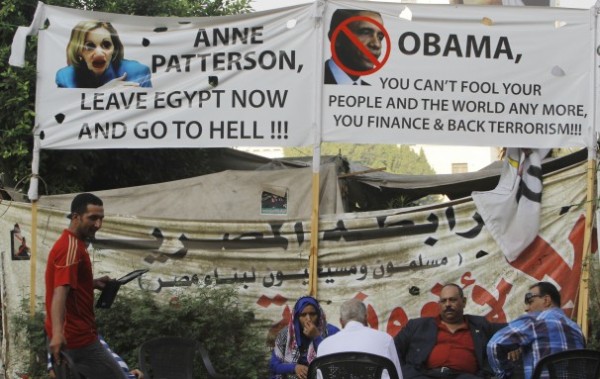
Nothing seems to be safe in Egypt these days. Political opponents of the military leadership are the chief targets for the attacks, attacks that include live fire from security forces. They are not alone: The seething rampages have spread to Christian churches, the media, foreigners, those held in custody, and even to the corpses waiting to be buried.
The place where President Obama first offered his words on the hopeful potential of the Arab Spring now is vying to become ground zero in what appears to be a contest as to who can stamp on those flowers of democracy the hardest, yank their roots out of the ground and then salt the earth.
Hope, as a campaign slogan, is very compelling. Hope as a strategy, less so.
William Butler Yeats, writing after World War I in the “Second Coming,” notes how, “Turning and turning in the widening gyre, The falcon cannot hear the falconer; Things fall apart; the centre cannot hold; Mere anarchy is loosed upon the world.”
The Obama administration seems to not have a plan to engage with and in Egypt. In that sense, it mirrors what the “plan” is for Syria where out of the limelight for a few days the killing continues. This week there are new reports of how President Bashar Assad‘s forces seemed to have gained a military edge – and may have engaged in using poison gas against civilians in what some reports say would be the world’s worst chemical weapons attack in decades.
http://www.reuters.com/article/2013/08/21/us-syria-crisis-idUSBRE97K0EL20130821
The lack of significant action by the west has contributed to Assad’s ability to rebound and regain apparent advantages in that civil war. The new – or perhaps renewed – military leaders of Egypt no doubt have learned that lesson.
The European Union is considering action to voice its displeasure with those running Egypt. The Obama administration is reported to be reviewing what U.S. aid to Egypt could be suspended.
Those reports of possible action have had little impact.
Now comes word that former Egyptian president Hosni Mubarak could leave prison very soon after a Cairo court ordered the release of the deposed leader if the 85-year-old former air force commander agreed to return or pay the value of gifts he received from state news organizations while in office, a spokesman for Egypt’s Foreign Ministry said.
Isn’t this where things started?
As the West remains flummoxed – again – those running Egypt seem intent on crushing the Muslim Brotherhood, arresting its members, flaming public resentment of the Morsi presidency and cracking down on a wide swath of groups and individuals. They also are going after others: A lawsuit was filed against Mohamed ElBaradei, who briefly served as Egypt’s vice president after Mohamed Morsi’s ouster before resigning in protest at the bloodshed last week and leaving the country.
In one of the great ironies of the week, Turkish President Recep Tayyip Erdogan – who seems to have avoided a rupture in his country despite a harsh crackdown (also conveniently out of the news) on protestors there – criticized the inaction of other nations to deal with Egypt. He criticized Egypt’s leader, Gen. Abdel-Fattah el-Sisi, and likened him to Assad.
Erdogan said Egypt must choose either the way of the Pharaoh or the way of Moses. It is as if he had read Yates.
Many scholars believe Yeats’ references reflect the Middle East, which he saw in the aftermath of the horror of the mad unchecked rush to develop better killing machines in the First World War and rising Anglo-Irish tensions. Yates projected doom coming from the Middle East as he continued:
“The blood-dimmed tide is loosed, and everywhere, The ceremony of innocence is drowned; The best lack all conviction, while the worst, Are full of passionate intensity.”
Scholars suggest the “blood-dimmed tide” could be referring to when Moses parted the Red Sea. The Pharaoh agreed to let Moses and his people leave Egypt, but then changed his mind. The Pharaoh and his men chased after them. Moses used his staff to part the Red Sea and lead his people to safety, and the Pharaoh and his army were drowned behind them.
Perhaps what Yates dropped from his early version of the poem reflects even more on the west today and its mushiness. One such dropped line laments that “And there’s no Burke to cry aloud, no Pitt” — references to political leaders in England who spoke out forcefully and took steps to try and solve problems.
In the Middle East today, the lack of Western leadership to attempt to restrain destruction and doom make Yates’ prophetic worries alive and grisly.
The center cannot hold because there is no center. Not in the Middle East and, increasingly, in fewer and fewer places around the world.
Photo credit: Amr Nabil/AP